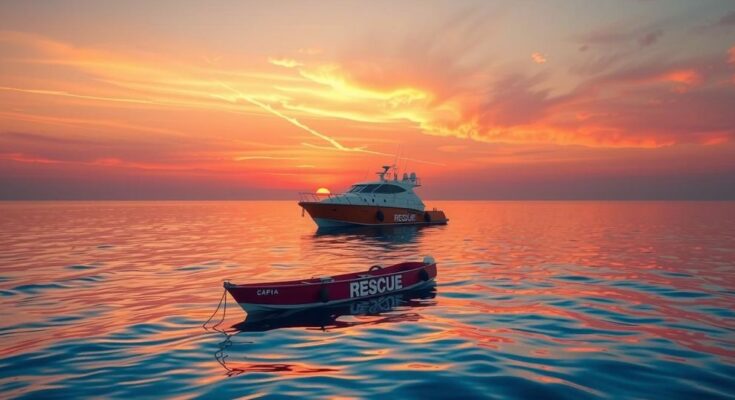Tunisian coast guards rescued 612 migrants in a record operation on March 17, drawing criticism of governmental handling of migrant affairs amid rising violence and insecurity. Protests over migrant-related issues have become frequent, while local and international tensions continue to escalate against the backdrop of increased EU scrutiny and pressure.
On March 17, Tunisian coast guards achieved a significant milestone by rescuing nearly 600 migrants in one night, amid increasing criticism of government handling of migrant situations. The Tunisian National Guard reported that 612 migrants were rescued during various sea missions, revealing distressing images of officers extracting survivors, some tragically including lifeless children. The National Guard characterized this incident as a tragic illustration of the grave dangers associated with perilous migrant journeys.
In recent months, there has been a marked increase in migrant crossings from the Sfax region of Tunisia. Many migrants have taken to living in makeshift camps within nearby olive groves, despite frequent police interventions. Ralph, an Ivorian migrant living in a grove since 2020, lamented the worsening conditions and shared his grief over losing two friends in a recent shipwreck, expressing concerns over escalating tensions in Sfax.
Violent incidents have exacerbated the dire situation, with the unfortunate deaths of two young migrants near El-Amra attributed to violence from self-styled security teams. These groups are believed to enforce order through intimidation and violence. Ralph noted that fear prevents migrants from seeking police support, as they are often arrested rather than helped.
The rising violence and insecurity have alarmed local populations, with frequent protests emerging in 2023. Following burglaries attributed to migrants, residents demonstrated their frustrations publicly, and Ralph expressed hope for tranquility following Ramadan, a time favorable for migrant departures.
The portrayal of the migrant situation has sparked alarmist sentiments in the media. Lawmaker Fatma Mseddi characterized the migrant camps as a “war zone” and called upon President Kaïs Saïed to witness the conditions firsthand. Many Tunisians have voiced their discontent on social media regarding the return of rescued migrants, with comments reflecting frustration over what they perceive as an influx of migrants.
Tunisia’s rescue operations are part of its commitments under a Search and Rescue agreement that began in June 2024, with European Union support, particularly from Italy. Critics of the cooperation have emerged online, with accusations of the Tunisian government appeasing European demands.
As pressure from the EU and Italy results in a significant increase in interceptions at sea, the Tunisian Forum for Economic and Social Rights reported that up to 70% of sea interceptions in 2024 have occurred from March to May in a year with a total of 14,124 interceptions thus far.
The recent mass rescue operation of 612 migrants by Tunisian authorities has underscored the challenges faced by the government amid escalating violence and discontent regarding migrant conditions. The rising tide of migrant crossings, severe local tensions, and international scrutiny compel the Tunisian government to address these complex issues carefully. The impending summer season promises further challenges as the situation continues to evolve.
Original Source: international.la-croix.com




